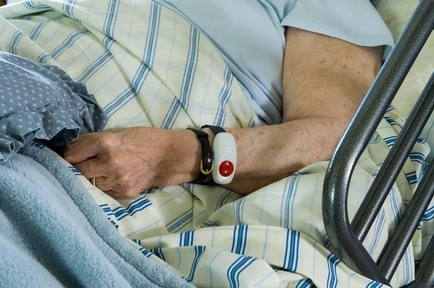House of Lords finds thousands of mental health patients locked up illegally
The House of Lords has found the Mental Capacity Act is failing to protect vulnerable adults with mental health problems such as dementia, with tens of thousands being restrained illegally in care homes and hospitals.

The inquiry into the use of the Mental Capacity Act found social workers, healthcare professionals and others involved in the care of vulnerable adults are not aware of its existence and are failing to implement it.
The Committee recommended that an independent body is given responsibility for monitoring the Act. At present there are many bodies involved in implementing the Act, but there is no single organisation in charge.
Deprivation of Liberty Safeguards needs to be scrapped
It also called for the controversial Deprivation of Liberty Safeguards (DoLS), to be scrapped and replaced with legislation in keeping with the language and ethos of the Mental Capacity Act as a whole.
Lord Hardie, chairman of the Committee, said: “We were very concerned by what we heard about the safeguards. The evidence suggests that tens of thousands of people are being deprived of their liberty without the protection of the law, and without the protection that Parliament intended. Worse still, in some cases the safeguards are being wilfully used to oppress individuals and to force decisions upon them, regardless of what actions may be in their best interests.
“In the face of such criticism, the only option is to start again. The Government needs to go back to the drawing board to draft replacement provisions that are easy to understand and implement, and in keeping with the style and ethos of the Mental Capacity Act.”
When the Act came into being, it was seen as a visionary piece of legislation, designed to protect and empower vulnerable people, such as those with learning difficulties, dementia, autism, brain injuries or temporary impairment.
The Committee does believe the legislation has the potential to transform lives. However Lord Hardie added: “What we want to see is a change in attitudes and practice across the health and social care sector which reflects the empowering ethos of Act.”
Luciana Berger, Labour’s Shadow Public Health Minister, called the failure of the Mental Capacity Act a “betrayal” which leaves the “most vulnerable people in society at even greater risk. It’s making their lives harder, not easier”.
“Individuals won empowering rights and recognition with this legislation – it’s distressing and wrong that safeguards are not being observed. Labour takes the Lords’ report seriously, and calls on ministers to respond with all urgency.”
Matter of urgency
Jeremy Hughes, chief executive of Alzheimer’s Society called the news that the Act is not working “deeply concerning given that it is intended to protect those most vulnerable in society, including those with dementia”.
“The safeguards in place to protect those under the Act are hugely complicated, preventing both professionals from using them correctly and the public from understanding them. Clearly this needs to be addressed as a matter of urgency.”
Beverly Dawkins, special advisor at Mencap, welcomed “all the recommendations of the Committee, particularly to set up an independent body to drive forward implementation and the need to review and reform the Deprivation of Liberty safeguards, which are currently not fit for purpose.”
She said: “Alongside work to ensure the law is embedded in practice, we want serious consideration given as to what sanctions should be applied, when there is failure to follow the law. For real change to happen, professionals need to know that there will be serious repercussions for failures to carry out their legal duties.”
The Government is expected to respond to the report within two months, after which both the Committee’s report and the Government’s response will be debated in the House of Lords in due course.
Latest News Analysis
 04-Sep-19
Extra £1.5 billion announced for social care in Chancellor's Spending Review
04-Sep-19
Extra £1.5 billion announced for social care in Chancellor's Spending Review
 02-Jul-19
Department of Health forced to rethink care homes' nursing rates after legal challenge
02-Jul-19
Department of Health forced to rethink care homes' nursing rates after legal challenge
 18-Jun-19
Overnight care workers forced to sleep in offices and told 'bring your own bedding'
18-Jun-19
Overnight care workers forced to sleep in offices and told 'bring your own bedding'
 14-Jun-19
Back in the closet: Third of care home staff have had no LGBT+ awareness training
14-Jun-19
Back in the closet: Third of care home staff have had no LGBT+ awareness training
 11-Jun-19
PM candidates on social care: Rory Stewart calls fixing care an 'unfinished revolution'
11-Jun-19
PM candidates on social care: Rory Stewart calls fixing care an 'unfinished revolution'